Travel
American Express Unveils Top Destinations and Business Travel Trends – Business Traveler USA

Business travel has always been the backbone of the global economy, connecting companies with clients, partners, and new opportunities. However, as the world continues to adapt to post-pandemic realities, the landscape of corporate travel is undergoing significant transformations.
American Express‘s latest Amex Trendex sheds light on these changes, offering insights into emerging destinations, evolving travel policies, and the role of technology in enhancing the business travel experience.
The Rise of Emerging Destinations
When thinking about business travel, major hubs like New York, London, and Tokyo usually come to mind. However, this year’s Amex Trendex report reveals a surprising shift towards less traditional destinations that are becoming increasingly attractive to corporate travelers.
For the first time, Amex identified five trending U.S. destinations based on commercial customer spending: Princeton, New Jersey; Durham, North Carolina; Southwest Michigan (Kalamazoo and Grand Rapids); Sacramento, California; and Honolulu, Hawaii.

Photo: Honolulu, Hawaii. Courtesy of Cosmin Serban / Unsplash
While not typically seen as business travel powerhouses, these cities are now experiencing substantial growth due to various factors.
Fernando Iraola, Executive Vice President & General Manager, Global & US Large Enterprises, American Express, tells Business Traveler, “These cities are emerging as hubs for certain industries and educational institutions, which explains their growing popularity for business travel.”
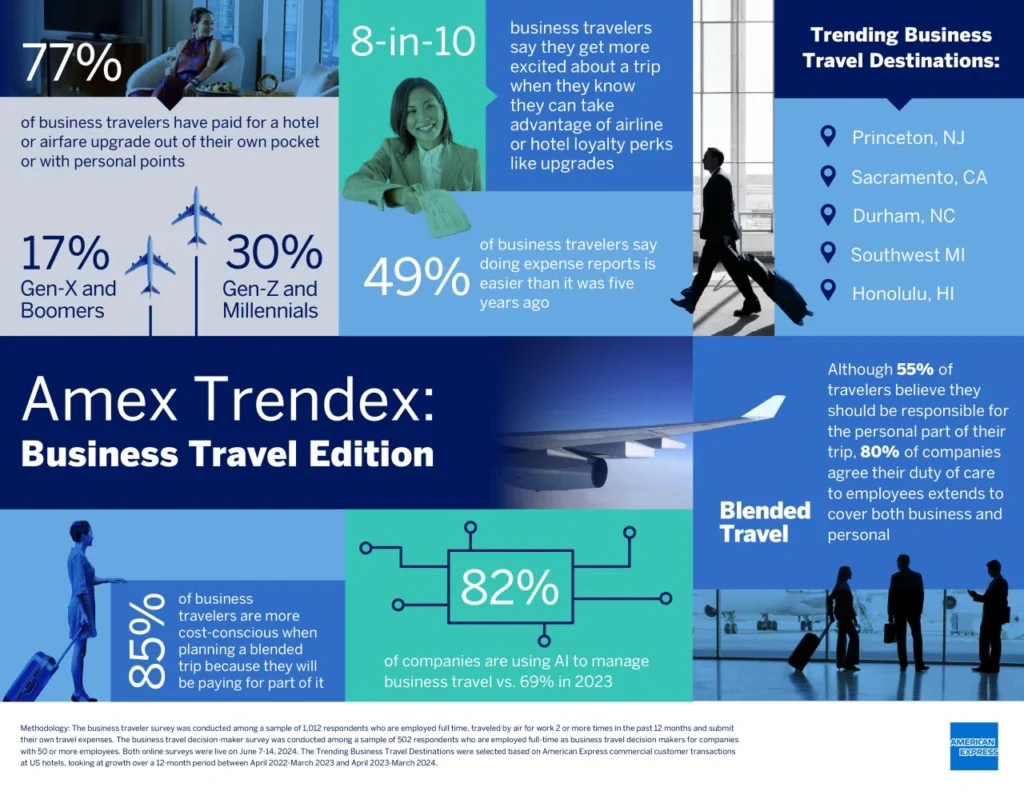

Graphic: Courtesy of American Express
According to Iraola, the report highlights the rapid emergence of Princeton as a leading hub for AI research, driven by the dynamic collaborations between Princeton University and the New Jersey Economic Development Authority, while Sacramento is drawing in tech talent by introducing new airline routes and a substantial $1.3 billion expansion of its airport.
Likewise, the tech boom in Durham shows no signs of slowing down, with continued growth attributed to the expansion of Raleigh-Durham International Airport.
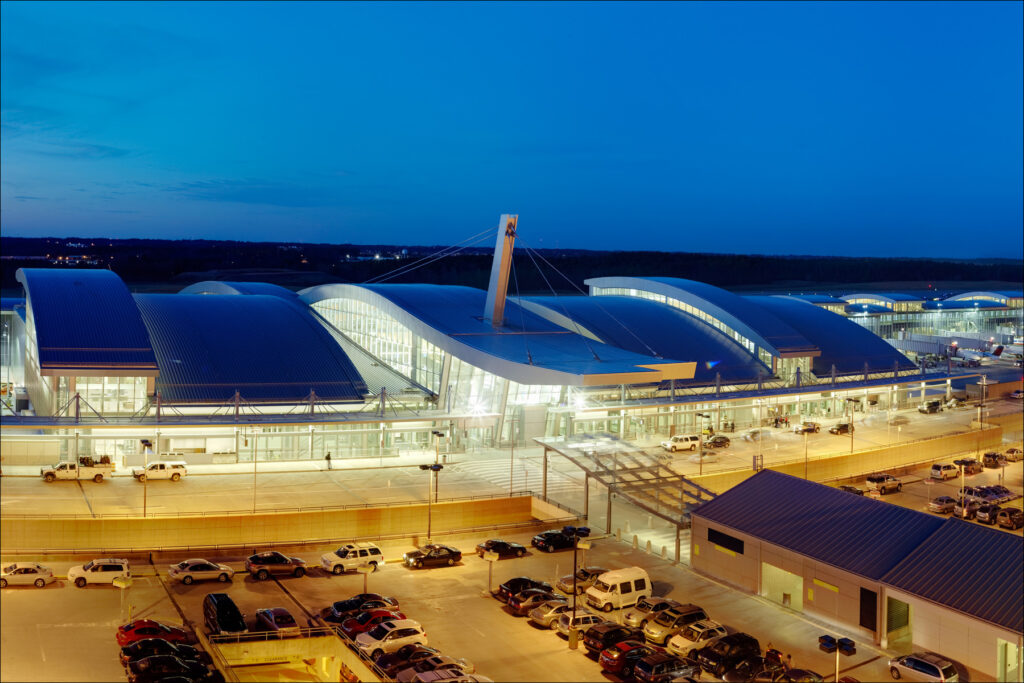

Photo: Courtesy of Raleigh-Durham International Airport.
Meanwhile, Southwest Michigan is gaining recognition for its attractive mix of corporate investment opportunities and rich cultural offerings, and Honolulu is increasingly becoming a premier destination for corporate retreats, boasting a unique blend of exotic allure and modern U.S. conveniences while successfully overcoming recent challenges.
Changing Preferences: The Blended Travel Trend
One of the most significant trends highlighted in the Amex Trendex report is the rise of blended travel—the practice of combining business and leisure on the same trip.
While the concept isn’t new, its popularity has surged in the post-pandemic era, particularly among younger travelers.
According to the report, 80 percent of business travelers enjoy exploring their destination when traveling for work, which has led to a tangible benefit for companies: 85 percent of travelers who took a blended trip in the past year reported being more cost-conscious when planning their travel.
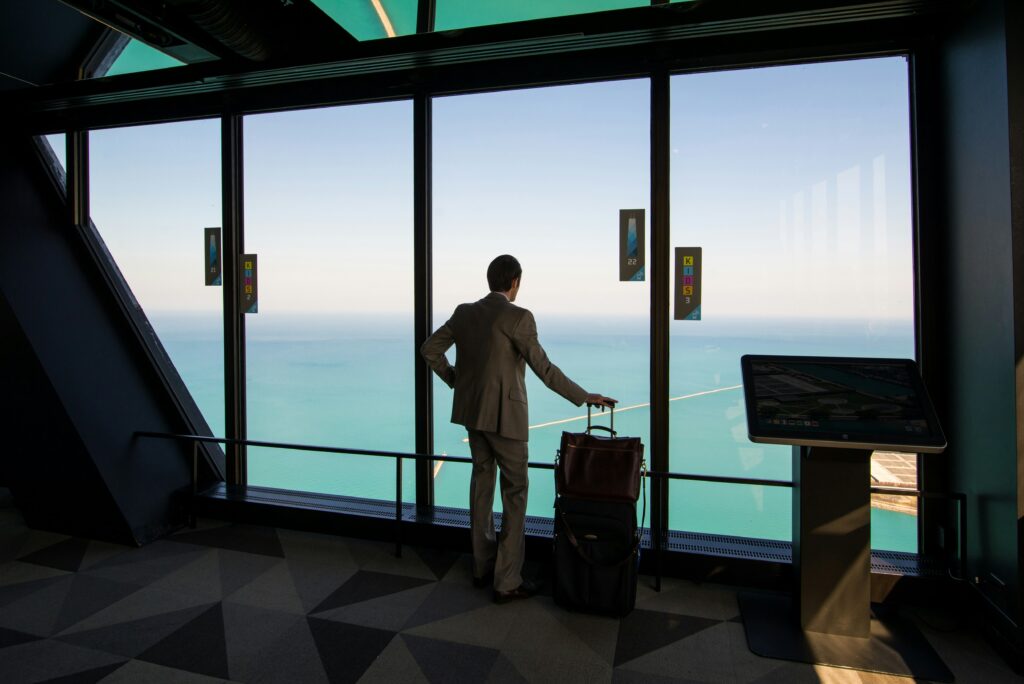

Photo: Courtesy of Artem Zhukov / Unsplash
According to Iraola, this makes sense. “When travelers know they’ll be covering part of the trip themselves, they’re more likely to seek out cost-saving opportunities,” he says.
However, there’s a disconnect in how businesses and travelers view their responsibilities. While 80 percent of companies that allow blended travel report that their duty of care covers the personal and business parts of the trip, only 55 percent of travelers believe they should be responsible for the personal portion. This discrepancy highlights the need for clearer communication and policy definitions to ensure that both parties are on the same page.


Photo: Fernando Iraola, American Express
“We’ve observed a significant rise in blended travel, where business travelers combine work and leisure,” adds Iraola. “Our research shows that 67 percent of business travelers are interested in this trend. It’s particularly popular among younger generations like Gen Z and Millennials. Interestingly, over 80 percent of businesses now support blended travel as part of their policies. This trend also leads to cost-conscious behavior among travelers, as they often cover part of the trip from their own pockets.”
Iraola also highlighted the importance of duty of care in this context. “Our research highlights a gap in understanding the duty of care for blended travel. While 80 percent of businesses feel responsible for both the business and personal portions of the trip, only 55 percent of travelers share this view. This reveals a need for clearer communication and policies around blended travel.”
The Willingness to Pay for Comfort
As business travel evolves, so do the expectations of travelers. Comfort has become a top priority, and many travelers are willing to pay out of pocket to ensure a better experience.
The Amex Trendex report found that while many companies cover business class seats on longer flights (85 percent), 77 percent of business travelers have paid for a hotel or airfare upgrade out of their pocket or with personal points.
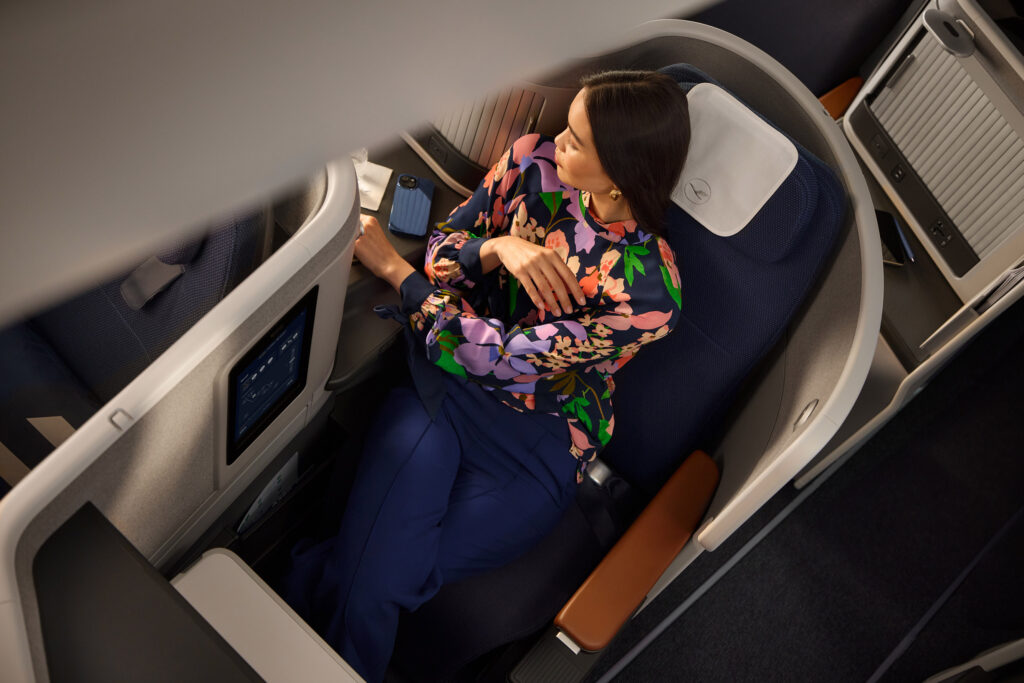

Photo: Allegris Business Class. Courtesy of Lufthansa
This trend is particularly pronounced among Millennials and Gen-Z, who are nearly twice as likely as Gen-X and Boomers to pay for upgrades frequently (30 percent vs. 17 percent).
This willingness to invest in personal comfort extends beyond just upgrades. The report says that eight out of ten business travelers (80 percent) get more excited about a trip when they can take advantage of airline or hotel loyalty perks. Yet, there’s a gap between what travelers want and what companies are willing to cover.
For instance, gym access is the top amenity that business travelers seek, but 47 percent of companies do not cover it despite 27 percent of travelers deeming it a “must-have.”
AI’s Growing Influence
Technology has always played a crucial role in business travel, and the Amex Trendex report indicates that this influence is only set to grow with the increasing adoption of artificial intelligence (AI).
According to the survey, 82 percent of companies are now using AI to manage business travel, a significant jump from 69 percent in the previous year. This includes using AI for travel and expense policy management (75 percent vs. 61 percent last year), booking travel (61 percent vs. 47 percent), and providing travel recommendations, support, or contingency planning (57 percent vs. 41 percent).


Photo: OpenAI. Courtesy of Zac Wolff / Unsplash
“American Express has been using AI and machine learning for decades, starting in 2010, to enhance our risk management processes, including fraud prevention and underwriting,” explains Iraola. “As technology has advanced, we’ve applied AI to personalize customer experiences, particularly for tech-savvy travelers and card members. Our goal is to offer personalized rewards and services at their fingertips.”
The continued integration of AI into business travel processes promises to streamline operations, reduce costs, and enhance the overall travel experience. However, as companies adopt more AI-driven tools, Iraola stresses there’s a growing need to train employees to use them effectively.
According to him, the Amex Trendex report found that more than half (54 percent) of companies using AI for business travel have taken steps to train their employees, helping to mitigate concerns about the proper use of these technologies.
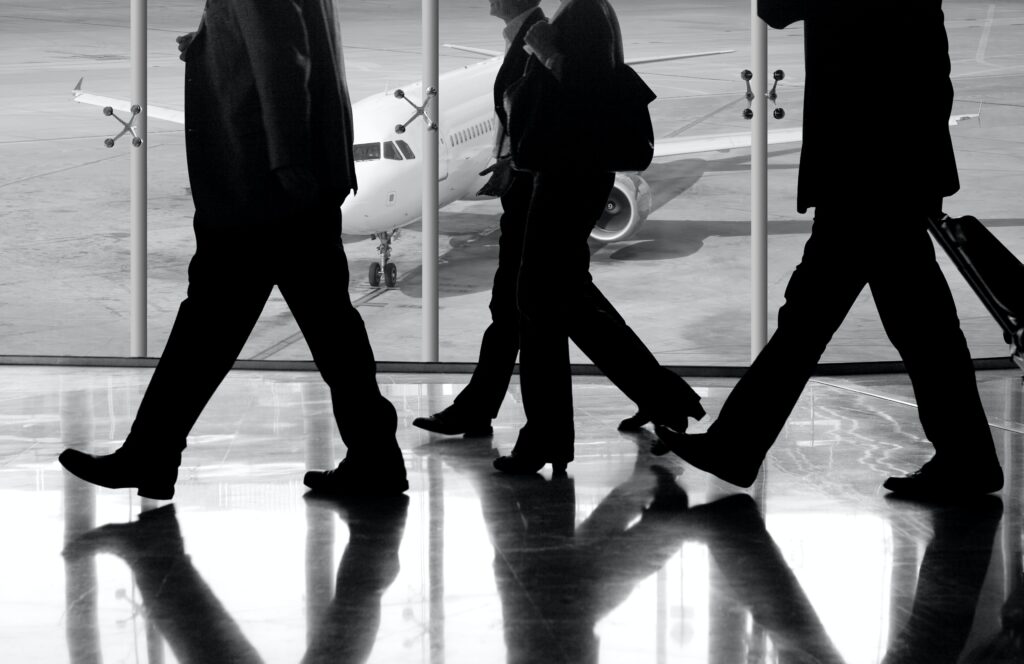

Photo: Courtesy of Rob Wilson / Unsplash
“Internally, AI is driving productivity and process improvements,” explains Iraola. “We’re committed to continuing investments in risk and operational management while maintaining the high level of service that sets us apart.”
“Importantly, we’re integrating AI with human touchpoints because, as our data shows, customer satisfaction is highest when there’s a combination of both,” says Iraola.
Business Travel’s Evolving Landscape
As we look ahead, it’s clear that business travel is not just recovering from the pandemic—it’s evolving. New destinations are emerging as key players in the corporate travel world, blending work and leisure has become more than a trend, and technology, especially AI, is reshaping how companies and travelers approach business trips.
The insights from the Amex Trendex offer a glimpse into the future of corporate travel, where personalization, convenience, and employee satisfaction will likely take center stage. With American Express nearing its 175th anniversary, the company is poised to continue leading the way in delivering innovative travel solutions that cater to the ever-changing needs of today’s business travelers.
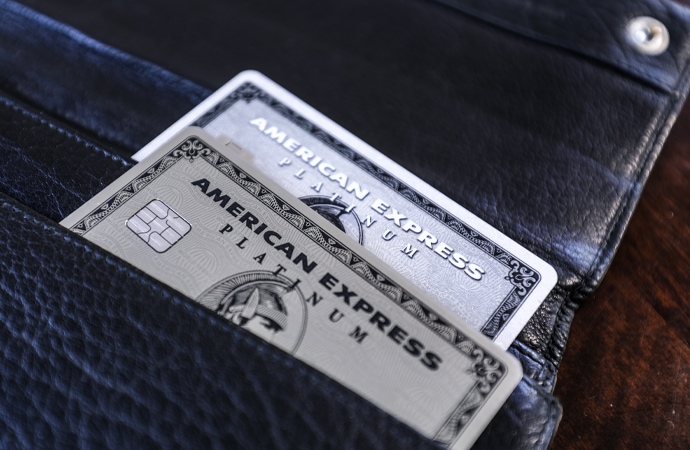

American Express Platinum Card / Photo: RYO Alexandre/Shutterstock
“We’re incredibly proud of our 175-year legacy, especially in how we’ve consistently supported business travelers,” says Iraola. “As we approach this milestone, we’re excited to continue innovating and enhancing the travel experience, particularly for the younger generation who now expect amenities like airport lounges as a standard offering, not a luxury.”
With ongoing innovations and a deep understanding of the shifting dynamics of business travel, American Express is well-positioned to navigate the future and help companies and travelers alike make the most of their journeys.









